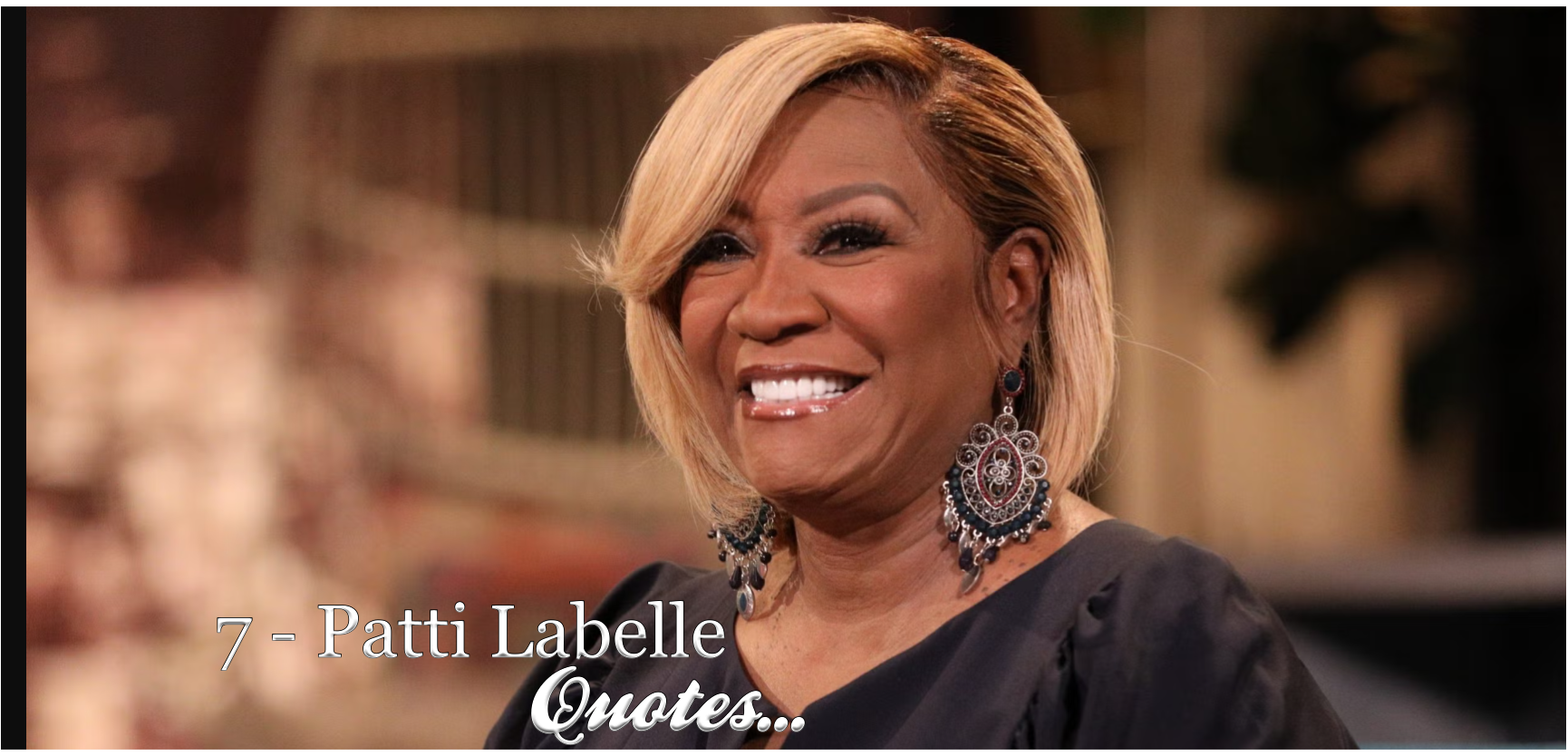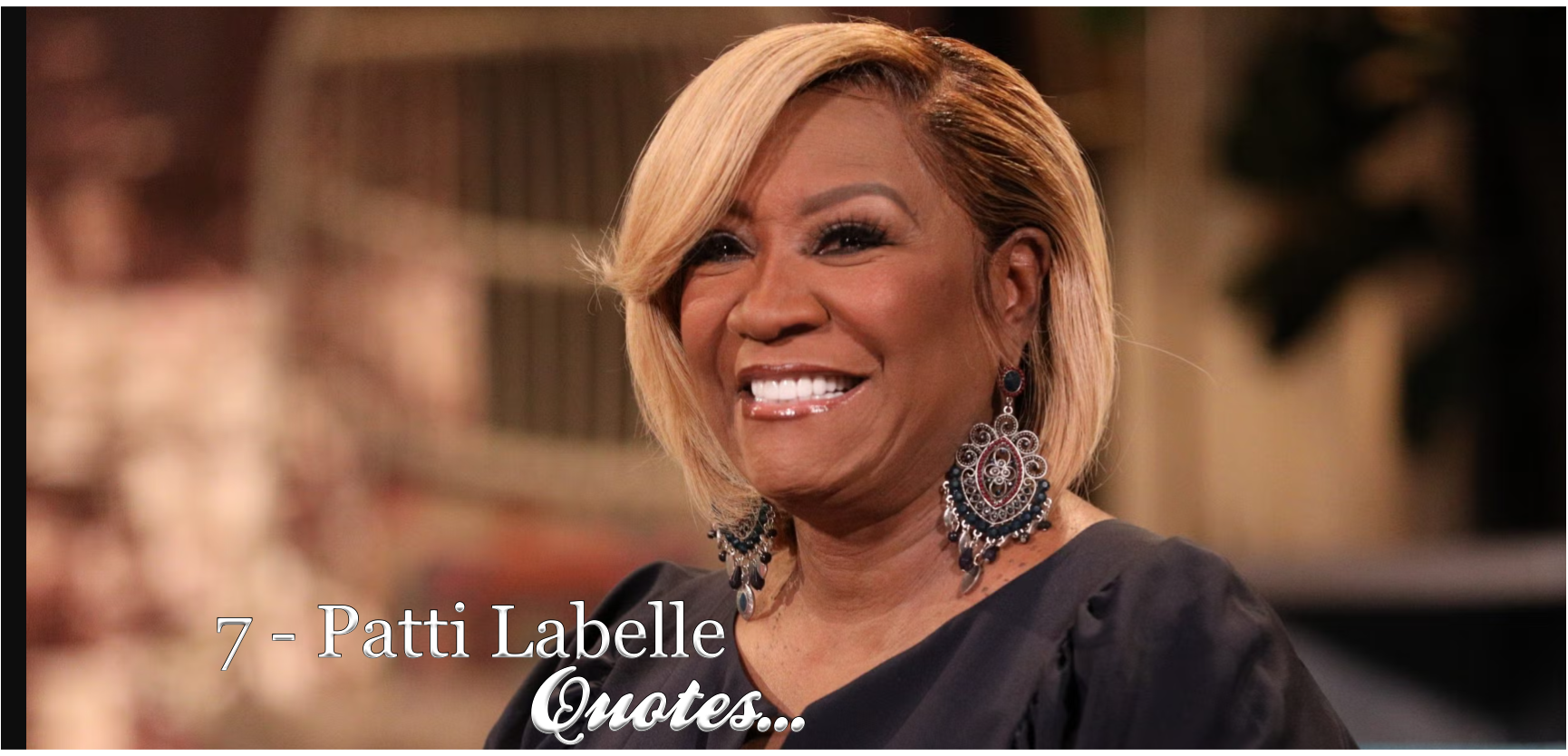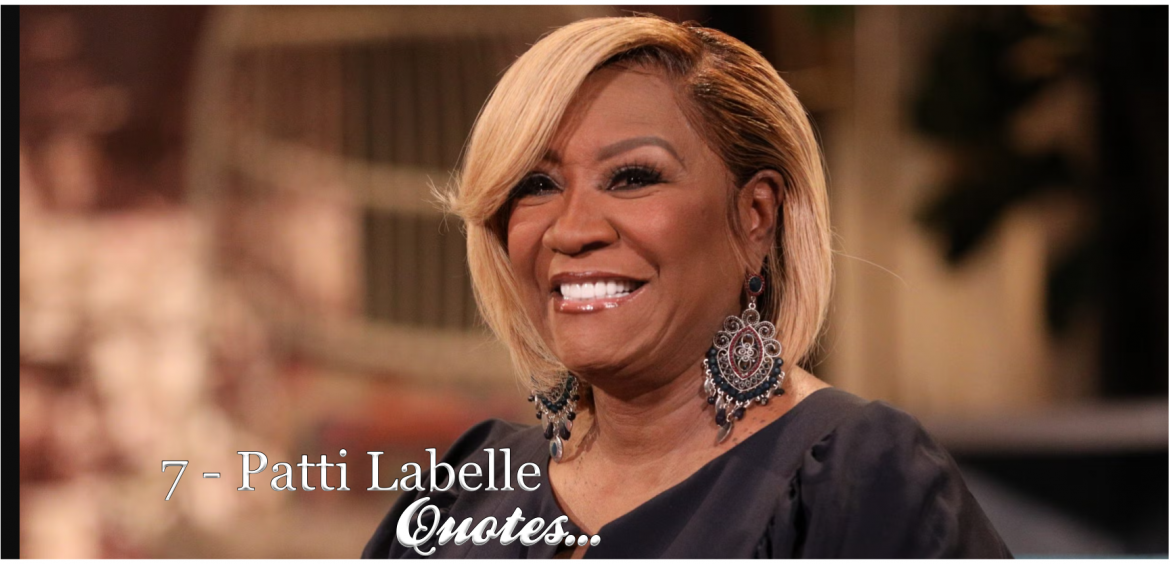-
 play_arrow
play_arrow
Praise 24/7 NO Today's Best Gospel

(ThyBlackMan.com) Patti LaBelle has never been just a singer—she’s been a cultural voice, a bridge between generations, and a living reminder of how Black artistry can shape the American story. Beyond her Grammy-winning songs and unforgettable live performances, her words often capture truths that go beyond the stage. Each quote reflects her resilience, humor, and wisdom, offering lessons that remain strikingly relevant today. Let’s explore seven quotes from Ms. LaBelle that deserve our attention, not only for their wit but also for the historical and cultural weight they carry.

1. “I just sing the stuff that makes me smile, makes me feel like I didn’t sell myself out.”
This statement reveals Patti’s unwavering commitment to authenticity. In an industry notorious for pressuring artists to chase trends, compromise their artistry, or dilute their cultural identity for commercial appeal, Patti chose to follow joy. That refusal to “sell out” situates her within a lineage of artists—from Mahalia Jackson to Nina Simone—who valued integrity over convenience. She saw her music not only as entertainment but as a representation of herself, and that required truthfulness.
Her words resonate deeply today, when so many creators navigate an economy built on likes, views, and algorithms. Musicians on streaming platforms often feel compelled to shape their art around viral potential rather than genuine inspiration. Patti’s approach reminds us that longevity in artistry isn’t built on pandering—it’s built on passion. By prioritizing songs that made her “smile,” she set a model for how creative fulfillment fuels artistic greatness.
This quote also demonstrates her quiet form of resistance. As a Black woman entering the music business during the 1960s, expectations were already stacked against her. Industry executives often dictated sound, style, and image. Yet Patti asserts that she retained control over her choices, protecting herself from exploitation. That was no small feat in an era when many women, especially Black women, were silenced.
For modern audiences, this quote challenges us to evaluate our own compromises. Whether in art, work, or personal relationships, Patti reminds us that integrity matters. Selling out may bring short-term success, but staying true to oneself produces a legacy. Her career, spanning over six decades, proves that authenticity not only feels good but also endures.
2. “You don’t have to be an angel, just be someone who can give.”
This quote captures Patti’s philosophy of compassion. She reframes the notion of generosity by stripping away perfectionism. You don’t need to be flawless, saintly, or angelic to make a difference. What matters is the act of giving—whether time, kindness, or resources. In historical terms, this connects directly to the communal traditions within African American culture, where survival often relied on neighbors, churches, and families sharing whatever they had.
By downplaying angelic imagery, Patti pushes back against unattainable ideals. Too often, society demands perfection before granting people permission to contribute. Her words democratize generosity: anyone can be a giver. It’s a reminder that philanthropy doesn’t belong only to the wealthy, nor does kindness require extraordinary qualifications. This reflects a larger history of Black women, particularly in the arts, who have embraced roles as caregivers to communities beyond their families.
Patti herself embodied this ethos through charitable works, mentorship of younger artists, and her role as an elder figure in music. She gave her time, her voice, and her wisdom, proving that giving is not about scale but sincerity. Her career demonstrates how giving—whether through music or presence—creates ripples that outlast the performance.
For today’s listeners, this quote is especially meaningful in an age of hyper-individualism. Social media often glamorizes self-promotion, yet Patti insists the real power lies in giving. It doesn’t take sainthood, only willingness. In that simple wisdom lies a radical call: we don’t have to be angels, just humans committed to helping each other.
3. “When I was married, I wasn’t loving myself. Now I’m in love with myself. I will get married again.”
This deeply personal quote reveals the intersection of self-love, relationships, and resilience. Patti reflects on her marriage, acknowledging that during that time, she didn’t prioritize her own worth. By declaring that she is now “in love” with herself, she affirms the importance of self-validation before pursuing romantic validation. In historical terms, this mirrors the broader feminist movement’s emphasis on women claiming autonomy and identity beyond marital status.
Her candor is striking. Many women of her generation were expected to sacrifice themselves for family or husband, often at the expense of their own happiness. Patti disrupts that narrative by admitting her past struggles and proclaiming growth. This is especially significant for Black women entertainers, who often carried the burden of performing strength for audiences while silencing private pain.
The statement also reflects optimism: Patti doesn’t reject marriage, but she reframes it. Instead of being an escape from loneliness, marriage becomes a partnership that must coexist with self-love. She sets a blueprint for future generations—love yourself first, then consider sharing that love with someone else. That message resonates far beyond celebrity culture; it is universal advice.
In today’s climate of shifting relationship norms, Patti’s wisdom rings louder than ever. People face pressures from social media portrayals of “perfect couples” and societal expectations about timelines for marriage. Her quote dismantles those pressures, affirming that self-love is the foundation. Only when you are in love with yourself can you enter a relationship from a place of strength, not dependency.
4. “I don’t tweet, Twitter, email, Facebook, look book, no kind of book. I have a land line phone at my home – that’s the only phone I have. If my phone rang every day like everyone else around me, I would lose my mind.”
This quote highlights Patti’s resistance to modern technology and her preference for simplicity. At a time when digital culture dominates, Patti’s decision to stay disconnected is almost revolutionary. She critiques the constant demands of hyper-connectivity, suggesting that an overactive phone line would erode her peace of mind.
Historically, artists have often embraced technology to expand their reach. From radio to television to MTV, innovation has transformed how audiences experience music. Yet Patti reminds us that progress doesn’t require full participation in every trend. Her choice of a landline connects her to an earlier era, signaling a desire to preserve boundaries. It also situates her as a cultural elder who demonstrates alternative ways of living in a digital-obsessed society.
The deeper message is about mental health. Patti implies that constant notifications create a state of frenzy that undermines well-being. In an age where anxiety and burnout are widespread, her decision offers a critique of 21st-century life. She values peace over immediacy, presence over distraction. For historians, this comment reflects generational differences in how technology is perceived, but it also underscores timeless human needs for quiet and balance.
For modern audiences, her stance is a challenge: do we really need to be available all the time? Patti demonstrates that refusing digital overload can be a form of self-care. In a culture addicted to screens, her preference for the landline is more than nostalgia—it’s resistance against losing oneself in constant noise.
5. “I’ve been shut down, run down, talked about, dogged out, but that never stopped me from the being the true me that’s here and will be here.”
This quote speaks to Patti’s resilience in the face of adversity. It echoes the broader struggles of Black performers who endured racism, sexism, and harsh criticism but refused to be silenced. Patti frames her hardships—being “shut down” and “talked about”—not as defeats but as trials that strengthened her commitment to authenticity.
Her statement has historical resonance with the civil rights era, when Black artists balanced artistry with activism while navigating systemic discrimination. Like many of her peers, Patti used music as a weapon against invisibility, insisting on her place in an industry that often marginalized her. Her insistence on being the “true me” aligns with the broader tradition of Black resilience: refusing to conform to oppressive narratives.
The quote also offers a universal lesson: perseverance. Patti acknowledges pain but refuses to be defined by it. This echoes the language of survival often found in gospel music, where tribulation becomes testimony. For a woman whose career spanned decades, including career reinventions and personal struggles, her words embody survival through faith in self.
For today’s audiences, her declaration feels like armor. In an era of cancel culture, public shaming, and constant critique, Patti’s resilience is a guide. No matter the obstacles, the key is to remain true to oneself. That authenticity becomes not only a shield but also a legacy, one that ensures Patti’s presence “will be here” long after critics fade.
Finish story here; 7 Patti LaBelle Quotes About Life, Love, and Resilience.
Written by: Black Gospel Radio
-

Praise 24/7 Commercial Free
For every Show page the timetable is auomatically generated from the schedule, and you can set automatic carousels of Podcasts, Articles and Charts by simply choosing a category. Curabitur id lacus felis. Sed justo mauris, auctor eget tellus nec, pellentesque varius mauris. Sed eu congue nulla, et tincidunt justo. Aliquam semper faucibus odio id varius. Suspendisse varius laoreet sodales.
close Top popular

The Science of Happiness – Exploring Factors for Well-Being

Balancing Act: Prioritizing Your Well-Being in a Busy World

Overcoming Procrastination – Strategies for Productivity and Success

Unlocking Hidden Potential – A Guide to Personal Growth

Mindful Living – Cultivating Presence in the Modern Era

CONTACT US
- info@praise247no.com
FOLLOW US
- Praise247NO
- Praise247NO
- Praise247NO
Copyright 2024 Praise247no.com - All Rights Reserved.





Post comments (0)